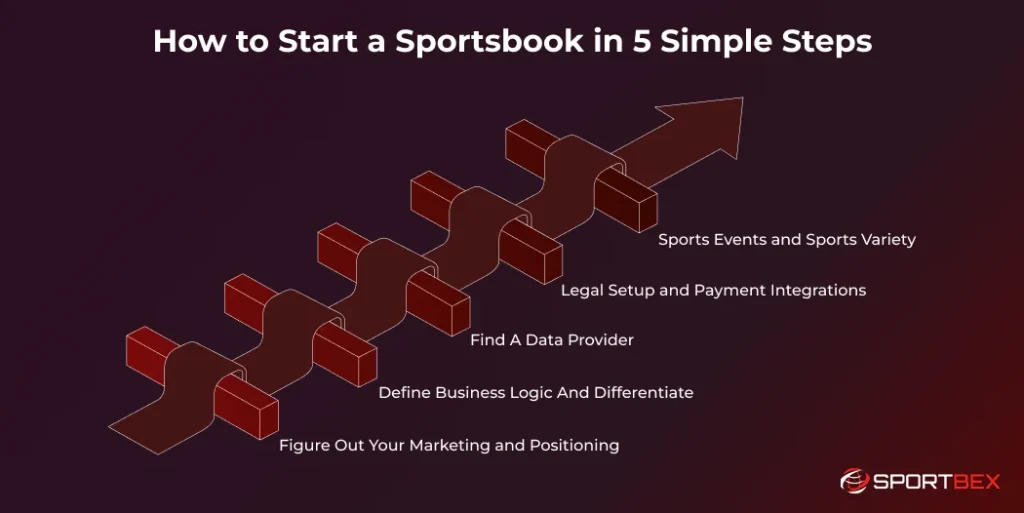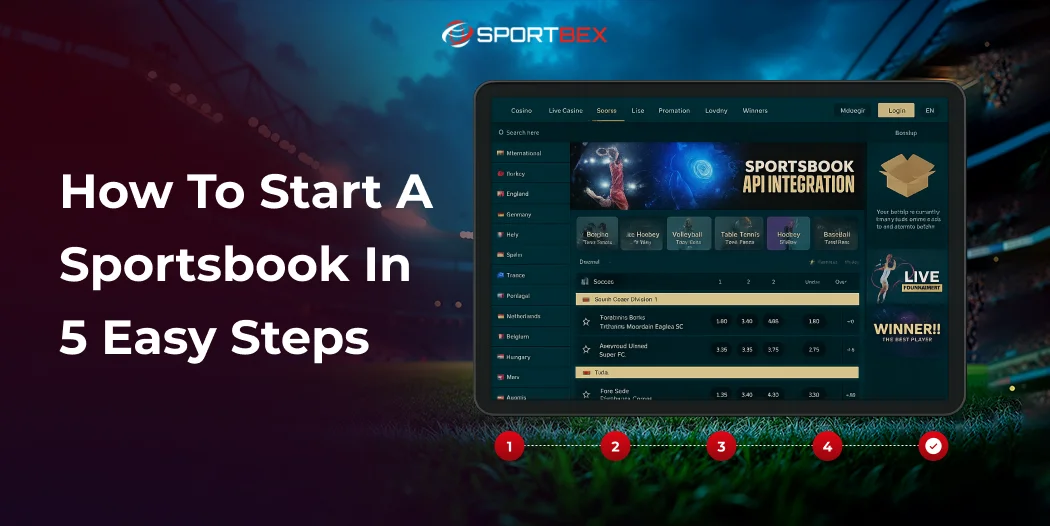Do you want to start your own sports betting business? Now is a great time! You can make money from your love of sports. It might seem hard to start, but we will show you how in easy steps.
The sports betting market has grown quickly in recent years, especially as more states have made it legal. This growth has created big opportunities for people who want to start their own sports betting business. Whether you love sports and want to earn money from your knowledge or are looking for a profitable business idea, starting a sportsbook could be your path to success.
The sportsbook industry isn’t just about luck or a good idea. It takes planning, knowing the rules, picking the right technology, and using smart marketing. Using a reliable sports betting API and modern sportsbook software makes opening a sportsbook easier than ever for anyone looking to start their own betting business.
In this guide, we’ll explain everything you need to know about how to start a sportsbook in 5 easy steps. We’ll cover what a sportsbook is, the steps to start your own sportsbook, the money you’ll need, the legal requirements, the technology you’ll use, and the latest market trends. This guide will help you make smart choices for your sportsbook business.
What Is a Sportsbook?
A sportsbook is an online or physical platform where individuals can place bets on a wide range of sports events, covering everything from popular sports like football, basketball, and soccer to more niche competitions such as eSports and fantasy sports leagues. These platforms are designed to cater to sports enthusiasts and bettors of all levels by offering a variety of ways to engage with the games.
Modern sportsbooks enhance the betting experience by providing features like live odds that update in real time, detailed results as matches unfold, and numerous betting options, such as moneylines, point spreads, and prop bets, ensuring there’s something for every type of bettor. Whether you’re a casual fan or a seasoned bettor, sportsbooks aim to make betting accessible, exciting, and tailored to your interests.
What Is A Bookmaker?
A bookmaker is the entity responsible for accepting bets, setting odds, and ensuring that all wagers are accurately paid out. Essentially, a bookmaker acts as the bridge between the player and the outcome of a sports event, providing a platform where individuals can place bets on various outcomes. The bookmaker’s role involves careful calculation to balance the bets placed on both sides, aiming to minimize risk while ensuring profitability.
For example, they may adjust odds dynamically to encourage more bets on one side if too much money has been wagered on the other. Their ultimate goal is to manage the betting process smoothly, creating a system where bettors can engage with the excitement of sports while the bookmaker maintains a controlled and sustainable operation.
How Do You Become a Bookmaker?
Becoming a successful bookmaker takes industry knowledge, business skills, and the right technology. Start by mastering sports and betting markets, learn how odds work, different bet types, and how to assess probabilities. Many bookmakers begin as skilled bettors, gaining hands-on experience in how the market operates. With the right expertise and tools, success becomes achievable.
Next, you’ll need to understand the business side of bookmaker sports betting. This includes learning about customer acquisition, retention strategies, financial management, and risk mitigation. The bookmaking business is essentially about managing risk while providing entertainment value to customers, so understanding both aspects is crucial.
Technology is crucial in modern bookmaking, from sportsbook software and payment systems to customer management tools and data platforms. Many new bookmakers partner with established tech providers to simplify setup. Equally important is navigating the legal landscape, including licensing, compliance, and operational rules, which vary by market. Understanding these aspects is key to running a successful sportsbook.
What Type Of Bookmaker Do You Want To Become?
Before starting your sportsbook, decide what kind of bookmaker you want to be. This choice will affect your business, audience, and how you run things.
- Traditional Sportsbook Operator: This means managing a sportsbook that includes many sports, different types of bets, and serves a large number of customers. Traditional sportsbooks need a lot of money to start and require licenses, but they can make a lot of money.
- Niche Sports Specialist: Some bookmakers focus on just a few sports or specific betting areas where they have special knowledge. For instance, you could focus only on esports, horse racing, or local sports if you know a lot about them and can offer special insights.
- White Label Operator: If you want to launch quickly without starting from scratch, consider becoming a White Label Sportsbook operator. This means teaming up with a technology provider who takes care of the technical side, so you can focus on marketing and getting customers.
- B2B Service Provider: Instead of running your own sportsbook for customers, you could offer services to other bookmakers. This might include creating betting odds, managing risks, or providing specialized technology.
Is it Legal to Start a Sportsbook?
The legality of sports betting depends on where you and your customers are located, as laws vary widely across regions. In some areas, like the UK and parts of Europe, online sports betting is fully legal and regulated, with licensing bodies ensuring fairness and consumer protection. These markets require a thorough application process to obtain a license.
In contrast, other regions, including parts of the U.S., have a more complex legal framework that varies by state. Understanding and navigating these regulations is critical for operating in this space. In 2018, the U.S. Supreme Court struck down a federal ban on sports betting, allowing states to legalize and regulate it individually.
Since then, states have created unique rules, with some permitting only in-person betting and others allowing full online wagering. Before launching a sportsbook, thorough legal research is essential to understand the laws in your target market. Consulting a gaming law expert is highly recommended to navigate licensing, compliance, and corporate structuring. Building a solid legal foundation is crucial to ensure your sportsbook operates smoothly and within the law.
How to Start a Sportsbook in 5 Simple Steps

Now that we’ve covered the basics, let’s go over the five simple steps to launch your sportsbook. These steps will take you from planning to getting your business up and running.
Step 1: Figure Out Your Marketing and Positioning
Your marketing strategy and brand positioning form the foundation of your entire sportsbook operation. Before you invest in technology or pursue licensing, you need to clearly define who your customers will be and how you’ll attract them to your platform.
Start by doing market research to find gaps in the current sportsbook industry. Are there groups of customers not being served well? Are there specific sports or betting options that are missing? Are there areas with little competition? Your research should show you where your sportsbook can offer something unique.
Identify your target customer by looking at their age, income, interests, betting experience, and tech skills. For example, esports fans need a different approach than horse racing bettors. When sportsbooks set odds, they also need to consider what appeals most to their target audience. Create a clear value proposition that shows why your sportsbook is better than competitors. Offer things like better odds, unique features, great user experience, or top-notch customer service. Keep it simple and focused on what makes you stand out.
Your brand should match your target customers. Think about your name, logo, website, and ads. How do you want people to see your brand? Will you be for big spenders, casual bettors, or serious analysts? Getting new customers is key, but it’s expensive. Use online ads, partnerships, and deals. Also, keep your current customers happy with loyalty programs and good service.
Step 2: Define Business Logic And Differentiate
This step is about how your sportsbook works. “Business logic” means the rules and processes that keep everything running. This is a great chance to make your sportsbook stand out.
Consider these elements:
Bonuses and Promotions: How will you greet new users? A popular idea is to give a bonus when they deposit money or a “risk-free” first bet. What about deals for loyal customers? You could offer better odds, insurance for certain bets, or a system where users earn points for each bet. Be creative! Your promotions can attract many users.
Betting Limits: What is the smallest and largest amount a user can bet? Smaller limits are good for casual players, while bigger limits attract high rollers. You can also set different limits for different sports or types of bets, especially when using a betting API for your sportsbook business to manage and automate these settings.
Risk Management Strategy: This is important for your long-term success. How will you handle big events? Most sportsbook software provides tools to help you track your risk in real-time and adjust odds when needed. You need a plan to manage large, one-sided bets to avoid big losses. For more advanced options, a Sportsbook API Integration can give you better control over your data and risk management.
3. Find a Data Provider
An online sportsbook needs reliable and fast data to work well. This includes pre-game odds, live odds, scores, and final results for thousands of sports events. Handling all this on your own is nearly impossible!
That’s why you need an Odds API Provider. These companies are experts in the sports betting industry. They use teams of professionals and smart algorithms to create accurate odds for many sports. This information is then sent to sportsbooks like yours through an API, helping you run smoothly.
When choosing a data provider, look for:
Speed and Reliability: In the fast-paced world of live betting, where odds can shift dramatically within seconds, even a minuscule delay in receiving data can have significant financial implications, directly influencing whether a bet results in a profit or a loss for your users, and consequently for your sportsbook.
Coverage: Do they cover the sports and leagues your audience cares about? Choose a provider that includes a wide range of sports, from popular to smaller ones. A good Sports data API is key to offering variety.
Flexibility: Does their API allow you to set your own odds or adjust the extra fee (vig) you charge? This flexibility is crucial because it lets you control your profit margins, which directly impacts your ability to generate consistent revenue.
Reputation: Partner with a trusted and well-established provider to ensure reliability and success. The quality of their data will play a critical role in shaping the performance and outcomes of your entire business will depend on the quality of their data.
4. Legal Setup and Payment Integrations
We’ve talked about the legal part, but now let’s make it official. This step has two main parts: setting up your company properly and adding safe payment systems.
Legal Structure: You need to set up your business officially. This usually means creating a company like a corporation or an LLC (Limited Liability Company), in a place where online sports betting is allowed. Your gaming lawyer is very important here. They will help you get the right gaming license. This process can take a long time and cost a lot of money because it involves thorough checks on your background and finances.
Payment Processing: Once your business is set up, you’ll need a way to manage payments. This means connecting to payment gateways so customers can deposit and withdraw money easily and safely. Offer multiple payment options like credit/debit cards, e-wallets, bank transfers, and even cryptocurrencies. Security is key—make sure your payment system follows PCI standards and uses strong encryption to protect customer information.
5. Sports Events and Sports Variety
To attract a broader customer base, it’s essential to provide a wide variety of betting options. Focusing solely on major leagues such as the NFL, NBA, or English Premier League might appeal to some, but it won’t capture everyone’s interest.
Global Sports: Offer a wide variety of sports from around the world. Soccer is the most popular for betting, so it includes leagues from different countries. Also cover tennis, golf, cricket, snooker, and motorsports, as they are very popular too.
Esports: Competitive video gaming is a fast-growing market for betting. Games like League of Legends, CS:GO, and Dota 2 are popular and can attract younger, tech-savvy audiences.
Fantasy Sports: Think about adding daily fantasy sports (DFS) games. Many sports fans like these games. A good Fantasy Sports API can help you add this easily to your platform.
Bet Types: Expand beyond basic win/loss bets with options like point spreads, totals (over/under), prop bets (player stats or specific game events), futures (long-term outcomes like championship winners), and parlays (combining bets for bigger payouts). More choices mean more engaged customers.
Current Market Trends in Online Sports Betting
Sports betting is always changing With new technology, the industry keeps evolving. To stay ahead, it’s important to keep up with the latest trends. Here are three big changes happening in sports betting right now.
AI-Powered Personalization
Sportsbooks are using AI to suggest bets, understand player preferences, and improve the betting experience. By analyzing user behavior, AI delivers tailored recommendations that feel intuitive and personalized. These tips keep players engaged, encourage more betting, and create a dynamic, interactive experience.
Modular Platform Architecture
A modular system offers a flexible foundation, making it easier to update your platform, add new features, and adapt to market changes quickly. This approach enables your sportsbook to scale and evolve without costly or disruptive overhauls. For instance, introducing a new payment method or enhancing user experience with additional tools becomes efficient, keeping your platform competitive and responsive to user needs.
Real-Time Data and Streaming
Live Sports Streaming and live odds are must-have features for competitive sportsbooks aiming to attract and retain users. By integrating reliable feeds, sportsbooks can provide accurate, real-time updates, keeping users informed and engaged. This enhances the betting experience and builds trust with consistent, precise information.
Get a Ready-Made Platform On Rent.
Get Started TodayConclusion
Starting a sportsbook can be challenging but very rewarding. It requires careful planning and execution. To succeed in how to start a sportsbook business, you need to understand what a sportsbook is, choose the right business model, and use reliable sportsbook software. Following legal rules and having secure payment options helps build trust and protect your business. Offering a variety of sports and betting options will attract more customers.
To stand out, you can use new technologies like AI in sports betting for personalized experiences, modular platforms, and real-time streaming. Sports betting is more than just taking bets. It is about creating a smooth, engaging, and trustworthy experience that keeps customers coming back. The market is competitive but growing, offering opportunities for those who are prepared.
By building a sportsbook that is easy to use, clear, and flexible, you can attract new bettors and keep loyal ones. With careful planning, strong partnerships, and ongoing innovation, your sportsbook can become a successful and profitable business in the fast-changing world of online sports betting.
Frequently Asked Questions
Costs vary depending on licensing, software, and marketing but typically range from tens of thousands to hundreds of thousands of dollars.
Starting a sportsbook requires careful planning, choosing the right business model, securing licenses, integrating reliable sportsbook software, and offering secure payment options. Understanding the legal requirements in your region is crucial.
You need sportsbook software, a secure payment system, and APIs for live odds and updates. Modern sportsbooks also use AI for personalization, modular platforms for scalability, and real-time streaming for a better user experience.
The legality of sports betting varies by country and region. It’s important to research local laws and obtain the necessary licenses before offering sportsbook services.
Offering live odds, diverse betting markets, a user-friendly interface, secure payments, and personalized experiences using AI can help attract new bettors and retain loyal customers.
Recent Blog
Why Use a Soccer Betting API for Sportsbook Development
March 3, 2026
How Accurate Are Live Odds on Horse Racing Online Bookmakers?
March 2, 2026




